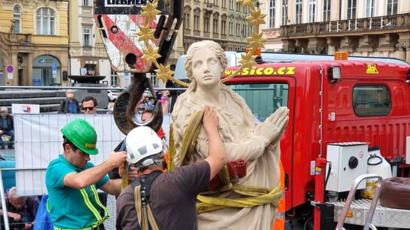Prague Catholic statue torn down by mob rises again

A controversial statue of the Virgin Mary has been returned to Prague’s Old Town Square, over a century after the original was torn down by an angry mob.
The 17th Century column was toppled in 1918, days after the collapse of the Austro-Hungarian Empire and the birth of an independent Czechoslovak state.
The statue is a perfect replica of the original Baroque Marian column.
The column bears aloft a gilded statue of the Virgin Mary and will later have four allegorical figures of angels.
But was the original a treasured monument to the salvation of Prague following the last siege of the Thirty Years’ War?
Or was it rather a hated symbol of Catholic supremacy and the failure of the Protestant Bohemian revolt?
It depends who you ask.
Conflict that ravaged Europe
“It was the people of Prague who wanted this statue!” said Jan Bradna, academic sculptor, restorer and a member of the Marian Column Restoration Society.
“It was they who lobbied the Habsburg Emperor Ferdinand III for permission to erect it,” Bradna told the BBC.
He explained that the townspeople wanted to give thanks for the lifting of the siege of Prague by the Swedish army.
That siege was the last act of the terrible 30-year conflict that had begun in the Bohemian capital in 1618 and went on to ravage most of Central Europe, leaving perhaps one tenth of Europe’s population dead.
The conflict was ended by the Treaty of Westphalia in 1648. The Habsburg rulers moved quickly to re-establish dominance over their exhausted and war-torn lands; Marian columns sprang up all over Bohemia and beyond.
In 1918, as the Habsburgs entered the history books, and a new country – Czechoslovakia – emerged from the ashes of Austro-Hungary, symbols of centuries of Catholic supremacy and Habsburg rule became targets of nationalist fervour.
On 3 November 1918, the statue was brought down by a mob led by a man named Franta Sauer, a notorious writer and Bohemian (in the artistic sense) from the working-class Prague suburb of Zizkov.
Sculptor Petr Vana, who produced the replica, told me Sauer had whipped up the mob in a Zizkov pub and then marched to the Old Town Square.
“It was fake news, really. People didn’t really hate the statue,” said Vana.
End to a bitter wrangle
The sculptor and the Marian Column Restoration Society, formed in 1990, have faced decades of obstacles and endless legal challenges.
It was opposed by both atheists – the Czech Republic is said to have more non-believers than anywhere in the world except North Korea – and representatives of Protestant churches. There were even scuffles on the square between supporters and opponents.
Finally, Prague City Council relented, planning permission was granted and the 15m (50ft) statue stands once again.
Franta Sauer himself is said to have expressed regret on his deathbed, reportedly asking for forgiveness from the Catholic priest who was giving him the last rites.
The statue’s restoration is the symbolic close to his act of “patriotic” vandalism.
Ayooluwa Joshua

